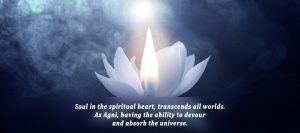Self Liberation
In ancient thought, it was believed that true liberation of man is liberation from the avidya, from ignorance. This does not destroy anything positive and real, because it is impossible, but negative, which blocks our view of the truth. When this hindrance, namely ignorance, is removed, only the eyelids are drawn and no eye is lost.
It is our ignorance that makes us think that we, as ourselves, are real, that it has its own complete meaning. When we take a wrong view of ourselves, we try to live in such a way as to make ourselves the main object of our life. Then we are destined to be disappointed like a man who tries to achieve his goal by clinging to the dust of the road. We have no means of holding us back, because it is its own nature which carries on; and by clinging to the threads of the self that pass through this loom of life, we cannot make them according to the purpose of the cloth being woven.
So it is the avidya that makes ourselves our fetters by making us think that it is an end in itself, and by preventing our sight from containing ideas that transcend its boundaries. That is why the wise come and say, “Free yourself from the avidya; know your true soul and be safe from the clutches of the self which imprison you.”
The Sanskrit word dharma which is usually translated as religion has a deeper meaning. Dharma is the innermost essence, essence, implicit truth, of all things. Dharma is the ultimate goal working within. When a mistake is committed, someone says that the dharma was violated, which means that a lie has been given to its true nature.
But dharma, which is truth within, is invisible, because it is inherent. So much so that it has been believed that sinfulness is human nature, and only by the special grace of God can one be saved. This is like saying that the nature of the seed is that it remains folded in its shell, and only by special miracle can it be planted into a tree.
In human history we have known the living seed in us to sprout. The freedom of the seed is in attaining dharma, its nature and destiny to become a tree; it is unattainment that is the prison. Sacrifices to attain their fulfillment are not sacrifices that end in death; it is renunciation that wins freedom.
When we know the highest ideal of freedom that a person has, we know his dharma, the essence of his nature, the true meaning of him. At first glance, it seems that man perceives this as the freedom with which he gets unlimited opportunities for self-gratification and self-augmentation.
The higher nature in man always seeks something beyond itself but which is its deepest truth; who demands all his sacrifices, but makes these sacrifices in return. This is human dharma, human religion, and the human self is the vessel that will bring this sacrifice to the altar.
We can see ourselves in two different aspects. The self which presents itself, and the self that transcends itself and thus reveals its own meaning. In order to present himself, he tried to be big, stand on the pedestal of his accumulation, and keep everything to himself. To reveal himself, he gave up everything he had; so that it becomes perfect like a flower blooming from a bud, pouring out from the chalice all its sweetness.
When we find that the state of Nirvāna as taught by the Buddha is through love, then we know for sure that Nirvāna is the pinnacle of love. Because love is an end in itself. Everything else raises the question “Why?” in our minds, and we need a reason for that. But when we say, “I love”, there’s no room for “why”; it is the final answer itself.
No doubt even selfishness drives one to give up. But a selfish person does it out of compulsion. But if one loves, giving becomes pleasing to him, like the giving of ripe fruit by a tree. All our possessions gain weight by the relentless gravity of our selfish desires; we can’t just throw it away from us. They seem to be part of our nature, sticking to us as a second skin, and we bleed when we shed them. But when we are possessed by love, its forces act in the opposite direction. The things that cling to us lose their attachment and weight, and we find that they are not from us. Far from missing out on giving it, we find it in the fulfillment of our being.
So we find in love our perfect freedom. What is done only for love is done freely, no matter how it painful.
Working for love is freedom of action. This is the meaning of the teachings of selfless work in the Gita.
Gita says our actions must have, only in our actions manifest our nature. But this manifestation is imperfect as long as our actions are not sincere. In fact, our natures are obscured by work performed by coercion of desire or fear.





